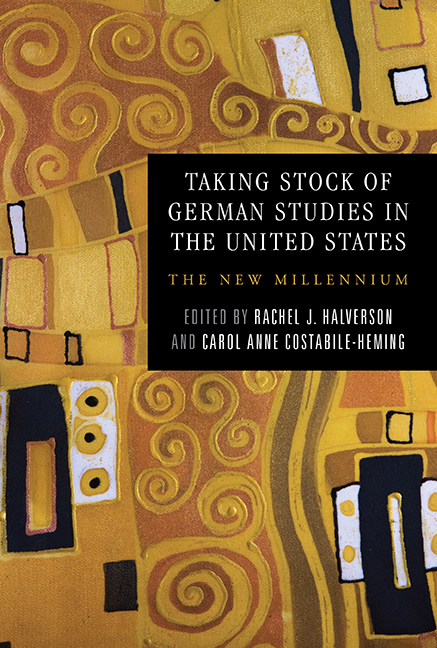1 - German Studies: The Short Version
Published online by Cambridge University Press: 10 June 2021
Summary
IN A VOLUME DESIGNED TO celebrate Helene Zimmer-Loew's accomplishments in the field of German studies, it is fitting to begin with some reflections about the course of the profession, from 1985, when she became executive director of the American Association of Teachers of German, until January 2012, when she retired as the much-beloved leader and spokesperson in the field of German language education in the United States. These reflections stray from the well-known story of the AATG during the last three decades and illuminate some general aspects of German studies. Since Zimmer-Loew has always, even during the most tedious speeches and meetings, kept up her unflappable cheerfulness, attentiveness, and optimism, I trust that she accepts the following short comments for what they are: substitutes for the much larger story of German studies, of which her work in language education has been an integral part.
The first focus of my comments is on the second half of the 1980s, when Zimmer-Loew reorganized and strengthened the AATG. She came at the right time, when the German teaching profession was undergoing an often painful, but necessary, transformation into a fully “American” undertaking. It was the period when language pedagogy fully had abandoned the “German” model of imitating native accuracy in favor of an American pedagogy of second language acquisition (SLA) that was geared toward nationally recognized practices and standards for teaching foreign languages. As a considerable achievement in response to the devastating report of the President's Commission on Foreign Language and International Studies in 1979, the various reforms gave foreign language instruction new professional legitimacy in institutions of higher learning. At the same time, literary scholars began to take more seriously the call for revamping not only curricula, but also the whole enterprise of German studies—the falling enrollments and the shifting interests of students made such thinking about reforming “content instruction” indispensable. The primary focus of the rethinking was a revamping of the traditional patterns of Germanistik that had guided faculty and students according to a literary and philological canon, which had often been devised by scholars trained in Germany and maintained within teaching practices and exam structures of German departments.
- Type
- Chapter
- Information
- Taking Stock of German Studies in the United StatesThe New Millennium, pp. 15 - 28Publisher: Boydell & BrewerPrint publication year: 2015
- 2
- Cited by

